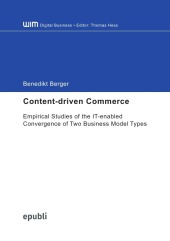 Neuerscheinungen 2017Stand: 2020-02-01 |
Schnellsuche
ISBN/Stichwort/Autor
|
Herderstraße 10
10625 Berlin
Tel.: 030 315 714 16
Fax 030 315 714 14
info@buchspektrum.de |

Benedikt Berger
Content-driven Commerce
Empirical Studies of the IT-enabled Convergence of Two Business Model Types
2017. 152 S. 210 mm
Verlag/Jahr: EPUBLI 2017
ISBN: 3-7450-4908-X (374504908X)
Neue ISBN: 978-3-7450-4908-4 (9783745049084)
Preis und Lieferzeit: Bitte klicken
This dissertation investigates the convergence of the business model types content and commerce on the Internet and provides theoretically as well as practically relevant insights.
Content and commerce are usually referred to as two different business model types on the Internet. While content comprises the aggregation, bundling, and distribution of informative, entertaining, or educating content, commerce is understood as the sale of goods and services. However, content and commerce are becoming increasingly intertwined.
From one side, media companies are trying to use content for the initiation of product sales to participate in revenues (revenue sharing). From the other side, online retailers have realized that they need content to make their stores more appealing for customers and to establish a relationship with them (content-driven commerce). The question therefore arises whether content is a decisive success factor for online retailers. At the same time, media companies are faced with the challenge to initiate transactions with their content in a profitable way without neglecting the content´s original purpose.
The present dissertation examines the relationship between content and commerce in three empirical studies from different perspectives. In addition to the theoretical findings, the results also provide specific recommendations for the development of business models which combine content and commerce.
Berger, Benedikt
Benedikt Berger promovierte an der Ludwig-Maximilians-Universität (LMU) München, wo er als wissenschaftlicher Mitarbeiter am Institut für Wirtschaftsinformatik und Neue Medien (WIM) arbeitete. Zuvor erlangte er einen Master of Science in Management von der Universität Mannheim. Seine Forschungsinteresseren sind Erlösmodelle für Medienunternehmen im Internet sowie nutzerzentrierte Informationssysteme.


